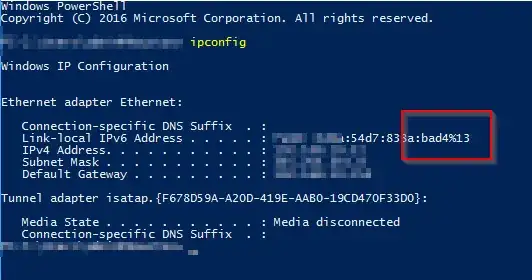That isn't an issue, it's just a random thing that can happen because IPv6. I'm not sure why the initial answers on this were given in the form of comments, but whatever.
IPv6 addresses are 128 bits long. If they were given in the same format as an IPv4 address, that would come out to something like
254.128.0.0.0.0.0.0.14.217.71.16.16.247.42.219
To make that shorter, they use base 16, which borrows the letters a-f for the extra six digits. They also put in another trick: the largest range of consecutive 0000 blocks can be simply eliminated, just marked by having a double colon. Because even
fe80:0000:0000:0000:ed9:4710:10f7:2adb
is pretty ridiculously long. Note by the way, there's also a 'd' and an 'a' apart from the 'bad' you noticed. So with the zero reduction, we get
fe80::ed9:4710:10f7:2adb
